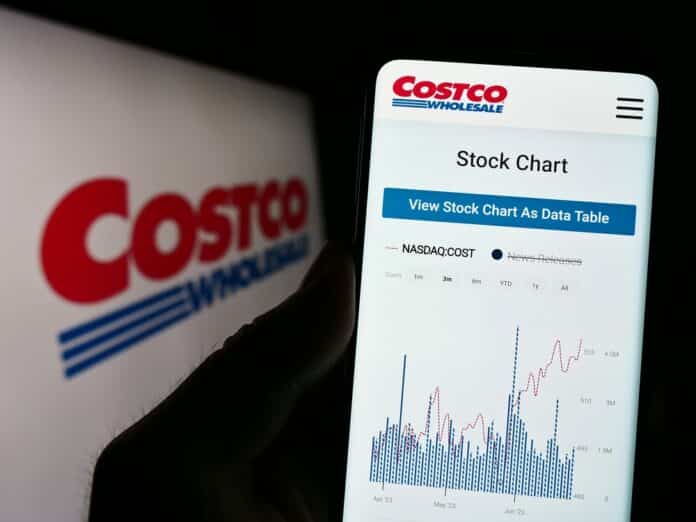Costco (NASDAQ:COST) holds the title as the undisputed leader in the warehouse club sector. The company, beloved for its $1.50 hot dog meal that hasn’t gone up in price since it was introduced in 1985, has recently become one of the top suppliers of gold and silver in the United States. Costco is renowned for its consistent track record of growing revenue and, more important, earnings.
As such, investors must pay a premium for shares of Costco, reflecting its stable growth and strong market position. Currently, the stock is trading at 46 times forward earnings, which is near the upper end of its historical valuation range. This high valuation was a contributing factor to the stock’s 4% decline in March, even though the company reported year-over-year increases in both revenue and earnings.
Costco Raises Dividend By 14 Cents Despite Rising Inflation
Just when investors thought they might get a discount on COST stock due to the recent sell-off, Costco announced a dividend increase of 14 cents. The new quarterly dividend of $1.16 will be paid on May 10, 2024, to shareholders of record as of April 26, 2024.
Costco’s decision to raise its dividend was not unexpected; this increase marks the 20th consecutive year that the company has boosted its payout. With a payout ratio of around 26%, Costco’s dividend remains one of the most secure in the market.
The increase of 14 cents represents a 13% rise from the previous year, and this comes on top of a $15 special dividend paid to investors in December 2023.
However, the significant aspect of this news is not just the amount of the dividend increase but its timing. Costco is voluntarily raising its dividend by 13% at a time when inflation, although lower than in 2022, is still trending above the Federal Reserve’s preferred 2% target rate.
What implications does this have? First, it suggests that Costco does not anticipate a decrease in consumer spending. If it did, the company would likely retain more cash on its balance sheet to mitigate potential financial headwinds.
Second, by boosting the dividend substantially, Costco is signaling to investors that it is confident about its future earnings growth
If It Was Easy, More Companies Would Do It
Costco benefits from a unique business model where customers pay a subscription fee to enter the store and shop. This model serves two significant purposes. First, the subscription fees contribute directly to Costco’s bottom line—an immediate and clear benefit for potential investors.
Second, the model ensures a degree of customer loyalty. Typically, the only reason members cancel their membership is if they feel they are not using it enough to justify the annual cost. In the case of Costco, the sustained membership renewal rates indicate that customers see substantial value in their subscriptions and are willing to pay more to continue accessing Costco’s services and products.
I’d call that a moat, even if some would disagree. And that’s another reason to invest in COST stock.
But Is COST Stock A Buy Right Now?
Should you invest in Costco stock for its dividend? Probably not. While Costco’s dividend is appealing, there are stocks with higher yields available if collecting dividends is your main investment goal. Owning shares of Costco is somewhat analogous to owning shares of Apple (NASDAQ:AAPL); both companies have substantial cash reserves, making the dividend almost a secondary consideration. The dividend, while a nice bonus, is not the primary reason to invest in either company.
Continuing this comparison, Apple is currently having a challenging year, with investor concerns centered around revenue and earnings, potentially making AAPL stock look slightly undervalued. In contrast, Costco is experiencing a strong year, with no apparent worries from investors regarding its financial performance, leading some to argue that COST stock might be overvalued.
Another aspect to consider is the history of stock splits for both companies. Apple last split its stock in 2020, marking the fifth time doing so. Costco, on the other hand, hasn’t split its stock since 2000. Given that COST stock is trading at 46 times earnings and with a stock price well over $700, a potential stock split could be an additional way for Costco to reward its investors in 2024, possibly making the stock more accessible to a broader base of investors that would attract many new investors that have been sitting on the sidelines for years, if not decades.


